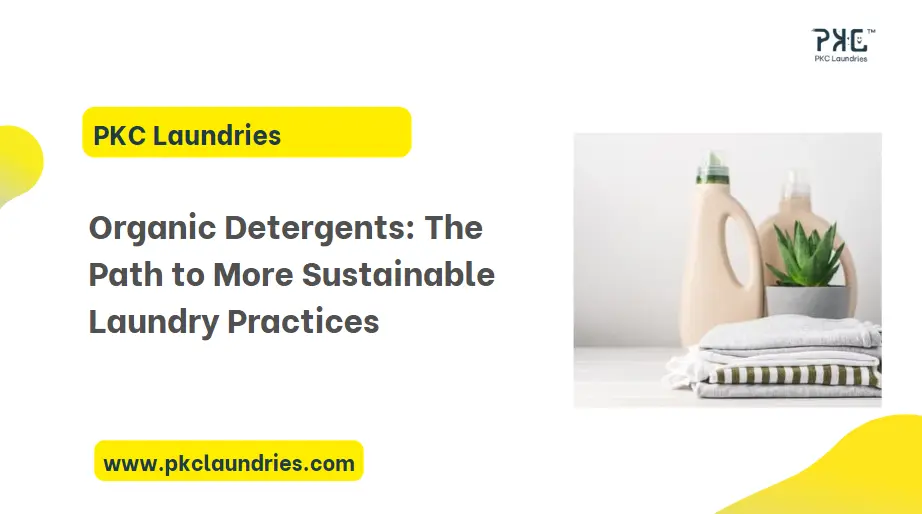Your laundry routine can harm the ecosystem, even though you are unaware! Traditional laundry detergents irritate skin, eyes, and lungs, causing asthma, polluting water bodies and destroying aquatic habitats due to their harsh chemicals like synthetic fragrances, surfactants, and dyes. In contrast, organic detergents are manufactured with sustainable materials that contain plant-based surfactants and biodegradable ingredients that are safer alternatives for you and more eco-friendly.
Why to Choose Organic Detergents
Safe Alternative for You And Eco-friendly
Reduced Environmental Impact: Organic detergents are becoming increasingly popular because they are made from plant-based and biodegradable material, which reduces environmental harm caused by regular detergents. Compared to petroleum-based chemicals in conventional detergents, plant-based ingredients used in organic detergents are more environmentally friendly and biodegradable as they replenish more quickly. Unlike organic detergents, conventional detergents contain harsh chemicals that persist in water bodies and deteriorate them, increasing the risk of uncontrollably growing algae that deplete the oxygen levels in water bodies. Organic detergents can lessen the pollution treatment facilities produce and reduce energy consumption. To save energy, certain organic detergents also call for lower wash temperatures.
No Toxic Residues: Organic detergents decompose entirely and do not leave any toxic residues behind on clothing. Organic detergents reduce the possibility of skin irritation or allergic reactions when wearing clothing that has been cleaned using traditional detergents. Some individuals may find the artificial scents found in traditional detergents to be very irritating. These perfumes have the potential to aggravate allergy or asthma symptoms as well as induce headaches, nausea, and dizziness. Alternatively, natural scents and plant-derived essential oils are used in organic detergents that reduce allergic reactions.
Organic detergents are less likely to cause respiratory problems, which makes them a better option for preserving indoor air quality, particularly in homes with small children or senior citizens.
Minimal Packaging Footprint: Compared to standard detergents, organic detergents are typically available in concentrated forms that require less packaging. By using less plastic and other materials in packaging, it lessens its total environmental impact. A reduced carbon footprint results from using fewer resources during production and transportation when there is less packing.
Tips for Choosing Organic Detergents
Look for Certifications: To ensure the authenticity of an organic detergent, check for certifications such as USDA Organic or EcoCert. These labels indicate that the product meets specific organic standards set by recognized certifying bodies.
Consider Your Need: Different organic detergents cater to different needs. Some are formulated for sensitive skin, while others focus on tough stains or eco-friendliness. Assess what matters most to you—whether it’s gentleness on the skin, effectiveness in cleaning, or environmental impact.
Ingredients List: Check the ingredient list. Organic detergents typically use plant-based or naturally derived surfactants and cleaning agents. Avoid products with synthetic fragrances, dyes, or harsh chemicals if you’re looking for a truly organic option.
Fragrance Preferences: Organic detergents may use essential oils or natural fragrances. Consider whether you prefer a fragrance-free detergent or one with a specific scent that appeals to you.
Packaging: Sustainable packaging is an important consideration. Look for detergents packaged in recyclable or biodegradable materials to minimize environmental impact.
Price vs. Value: Organic detergents can vary in price. Compare the cost per load or per ounce to determine the value you’re getting. Sometimes, paying a bit more for a concentrated formula or a larger pack might be economical in the long run.
Reviews and Recommendations: Read reviews from other users to gauge the effectiveness and performance of the detergent. Real-life experiences can provide valuable insights into how well detergent works in different washing conditions.
Allergies and Sensitivities: If you have allergies or sensitive skin, choose a detergent that is specifically labelled as hypoallergenic or suitable for sensitive skin. Organic detergents are generally milder, but individual reactions can vary.
Effectiveness: Ultimately, the detergent should clean your clothes effectively. Look for claims or reviews that indicate how well it removes stains and odors without compromising on cleanliness. For cleaning delicate fabrics that are heavily soiled or stained, it is important to go with professional dry-cleaning services (CHECK OUT OUR DRY-CLEANING SERVICES AT PKC LAUNDRIES)
Common Challenges Faced and Solutions
Concentrated Form: Organic detergents clean surfaces more thoroughly with less volume because of their strength. They become more effective as a result, but this also makes overuse simpler. Measure the detergent carefully per the manufacturer’s instructions to prevent overuse. Use the dosage advised based on the load size to guarantee efficient cleaning with no waste.
Excessive Suds: A common ingredient in organic detergents is a foaming agent from plants or other natural sources. Even though these often do not do as much harm as the synthetic surfactants in traditional detergents, too much foam might be an issue as they deplete the oxygen levels in aquatic ecosystems by hindering oxygen exchange from the water’s surface. To avoid creating too many suds, focus on the amount of foaming agent in organic detergent. Maintaining the right balance and protecting aquatic environments can be achieved according to the instructions on the detergent label.
Following recommended dosage: The key to avoiding this problem is following the manufacturer’s instructions on the detergent label. They will specify the exact amount needed for a particular load size. Using the right amount ensures effective cleaning without creating excessive suds.
Challenges faced in transitioning from traditional detergents to organic alternatives
Cost: The cost of organic detergents is typically higher than that of conventional detergents. This is because organic detergents might not take advantage of production economies of scale and employ a higher proportion of plant-based ingredients than traditional chemicals in regular detergents.
Power to Clean: Certain individuals discover that conventional detergents work better on stubborn stains, particularly oily ones. To get the same level of cleaning with organic detergents, pretreat stains using natural ingredients.
Experimenting: Your washing regimen may need to change if you use organic detergents. It might be necessary to try a few different kinds or utilize hot or cold water temperatures to achieve the best outcomes.
Fragrance: Conventional detergents frequently have overpowering scents, which some people find appealing. Organic detergents might be completely scent-free or have softer scents that come from essential oils.
Solutions for overcoming barriers to adopting organic detergents in laundry practices.
Pricing: To minimize the expense of organic detergents, keep an eye out for offers or discounts. As a long-term investment, you can gain both health benefits and environmental advantages from using organic detergents.
Ability to Clean: Pretreat tough stains before use, or redefine your washing cycle to make room for possible differences in cleaning efficacy.
Accessibility: Look into speciality shops and internet merchants who provide a large selection of organic detergent solutions. To make sure you have a sufficient supply, think about buying in bulk or making advance plans. When there is a time constraint involved, while cleaning your laundry as a working person, a student, or someone going to a party, you can always opt for professional cleaners who can do your job effectively, efficiently, and quickly.
Testing Out: To maximize the effectiveness of organic detergents, consider modifying your laundry regimen. To determine what works best for you, try a variety of brands and washing settings.
Tips for Using Organic Detergents in Your Laundry Routine:
Try Various Brands: Choose an organic detergent that best meets your needs and tastes by experimenting with different brands, especially for stubborn stains or particular smells.
Observe the directions: Follow the dosage instructions provided by the manufacturer to guarantee thorough cleaning and prevent residual problems.
Modify the Wash Temperatures: Many organic detergents perform well in colder climates, saving energy while increasing the life of clothing. If needed, use warm water, but be sure the detergent is compatible with it first.
Select the Appropriate Cycles: Choose the right wash cycle (mild for delicate fabrics), paying attention to any cycle recommendations on the detergent label.
Keep Safely: Store detergents according to the instructions on the label. To avoid clumping, make sure the containers are sealed.
Use Before Expiration: To keep detergent effective, check the expiration dates.
Avoid Cross-Contamination: To ensure the longevity of your clothing’s quality, make sure that you do not mix your organic detergents with other cleaning supplies.
A step toward a more environmentally friendly lifestyle is using organic detergents. Commit to sustainable decisions for your laundry routine and beyond to help create a greener and healthier planet. Now is the time to make a change for a better tomorrow. To achieve the greatest results, start slowly, try several brands, and modify your wash settings. To promote a greener lifestyle and a healthier planet, switch to organic detergents right away.
Choose a organic laundry solution with PKC Laundries. Explore the benefits of organic detergents for a cleaner, eco-friendly wash. Contact PKC Laundries today.



